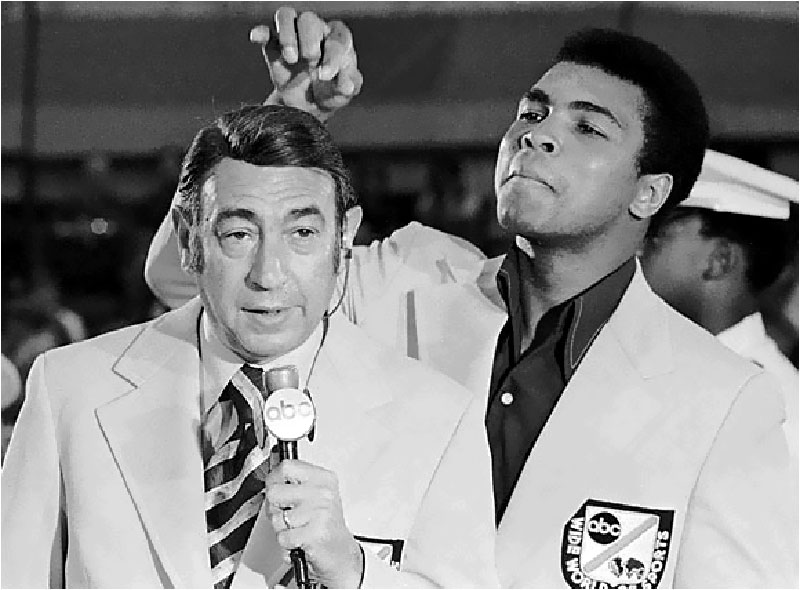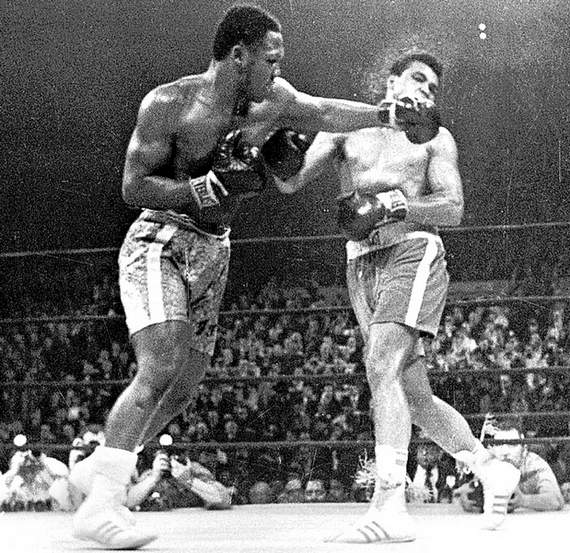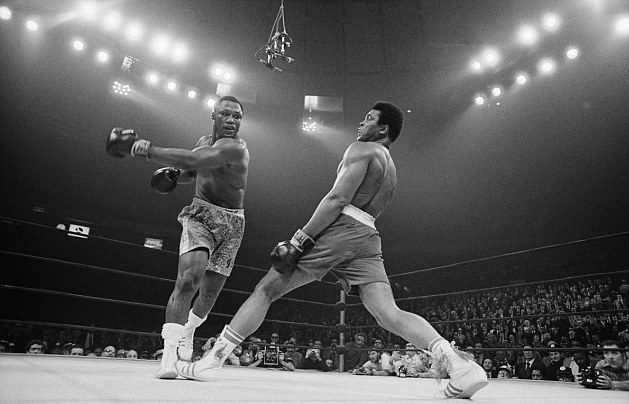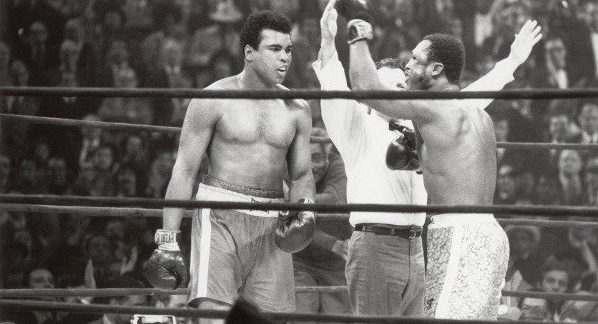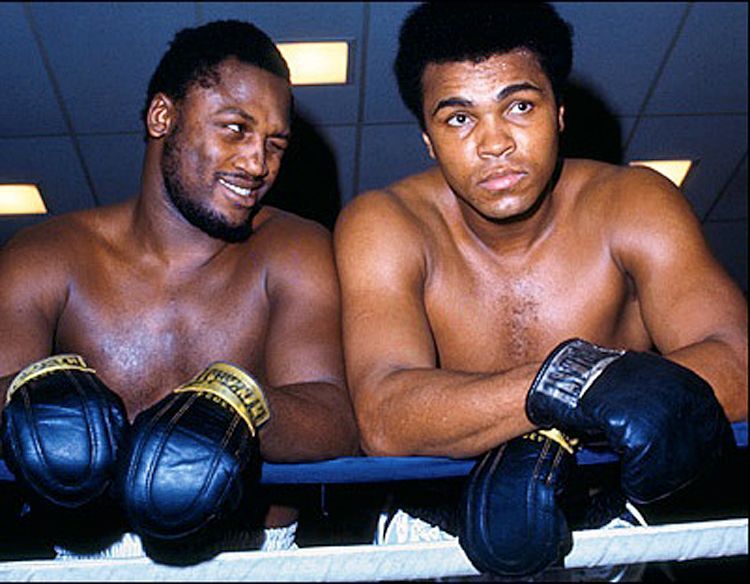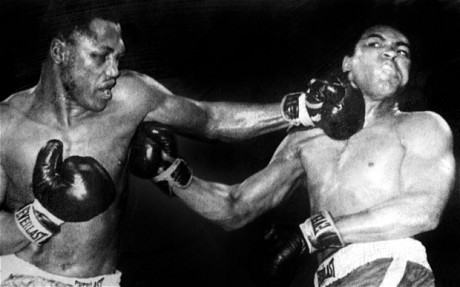Howard Cosell guest hosts for Mike Douglas in 1972, welcoming (and baiting) his old sparring partner Muhammad Ali. The year prior, the boxer had lost for the first time in his career, to Joe Frazier in the so-called “Fight of the Century,” which is considered by some to be the greatest night in NYC history.
You are currently browsing articles tagged Joe Frazier.
Tags: Howard Cosell, Joe Frazier, Muhammad Ali
Pete Hamill refers to the evening of the first Muhammad Ali-Joe Frazier fight, which took place on March 8, 1971 at Madison Square Garden, as “perhaps the greatest night in the history of New York City.” Maybe. Of course, it would have been amazing to be in Times Square when WWII ended or to hear Abraham Lincoln speak at Cooper Institute in 1860 or to be there in 1927 to watch the ticker-tape parade for Charles Lindbergh after his transatlantic solo flight.
But Ali-Frazier was no doubt very special, considering the political backdrop of the former Cassius Clay being stripped of his title and two of the greatest heavyweights ever meeting while each was still undefeated. Just prior to the fight, Life magazine published a cover story by Thomas Thompson about that anticipated match, “Battle of the Champs.” An excerpt:
There is almost an obscene aura of money hanging over the fight. It might seem to be the ultimate black man’s revenge–each fighter getting his $2.5 million. But the white man will, as per custom, get his. The promoter of the fight is a 40-year-old California theatrical agent and manager named Jerry Perenchio whose clients include Richard Burton, Andy Williams, Johnny Mathis and Henry Mancini.
Perenchio is a pleasant man who wears monogrammed shirts and who would seem to be more at home beside a Beverly Hills swimming pool than at ringside of Madison Square Garden. But he is so far cleverly navigating his way through the turmoil. “I feel like I am smack in the middle of the court of the Borgias,” he said the other day. “So far I am being sued in various lawsuits totaling $58 million, and I have people calling me for tickets–the same people who, before the fight, I couldn’t even get on the telephone.”
The fight will be seen in at least 350 closed-circuit locations in America totaling 1.7 million seats, at prices ranging from $10 per ticket to $30. (Top price at Madison Square Garden is $150, but scalpers are already getting $500 per ticket.) “There’s never been anything like it in my lifetime,” says Perenchio, “very possibly since time began.”
Promoting the fight has not been without its problems. Perenchio simply took the map of America and the world, carved it out into various sections, and set a price tag on each for the closed-circuit rights. If the price was met, the rights were granted. If not, they were withheld. So far, more than 20 auditoriums in the U.S. have been withheld from potential entrepreneurs because of Muhammad Ali’s conviction on draft evasion charges.
The fight will be seen live in Canada, Peru, Argentina, Mexico, Japan, and in England at 4 a.m. There would be considerably more outlets if there were enough time. ‘We only had two months really to promote it,’ complained Perenchio. “We’re like a guy in an orchard with only a limited amount of time to pick the fruit. We can only get at the lower branches.”
Perenchio is not overlooking any way to make money from the event. Besides the expected $20 million to $30 million gross anticipated from the fight itself, he is selling the rights to the souvenir program, between-rounds commercials, a special poster and post-fight movie–to be delayed for six months–for a total of $4 million. “We haven’t sold it yet, in fact we’ve only had a few offers of $500,000 or $250,000. We just don’t want to schlock it.”
On top of all this, Perenchio actually plans to seize both boxers’ trunks and gloves so that he can auction them off later. “If they can sell Judy Garland’s red Oz shoes for $15,000, then we should get at least as much for these,” he said. “We get a little blood on the trunks, it makes them all the more valuable.”•
Tags: Joe Frazier, Muhammad Ali, Pete Hamill, Thomas Thompson
Life is a fight that’s long and bruising, the score changes regularly yet surprisingly, and no one really wins in the end. And that’s for the fortunate ones. When we’re at our best or worst, it seems like it will go on forever, that no fall or rise is possible. But the sands shift and the tides are unimpressed. We can spend our time marking down who’s leading, but we’re all falling behind.
Two fighters, Muhammad Ali and Joe Frazier, brought out the best and worst in one another. Their three fights in the early 1970s made them legends and made them old. Ali used ugly, racist words to describe his fiercest opponent. It was the Greatest at his lowest. Frazier relished Ali’s eventual physical decline, diminishing himself in the process. They were both winners, but it wasn’t enough–the other had to lose. Ali seemed better about letting go of the feud in later years, but let’s remember that he won two of the fights. From “The Lonesome Death of Smokin’ Joe Frazier,” Tom Junod’s 2011 Esquire piece about the rivalry that couldn’t end on its own terms:
“The only time I ever met Joe Frazier was in downtown Atlanta, outside the arena used as a boxing venue during the 1996 Summer Olympics. The week before, Ali had once again “shocked the world” when he was handed the torch at the opening ceremonies, and then he elicited both pity and awe when he shakily climbed the stairs and ignited the Olympic flame. Despite winning the gold medal in the 1964 Games, Joe wasn’t invited to the stadium that night, and now he was selling T-shirts in a jerryrigged shack outside the boxing arena, just another of the carnie barkers who infested downtown during the games and turned Atlanta into an eyesore. His son Marvis — the former heavyweight contender who had been knocked out as if by a gunshot by a Larry Holmes right hand and then almost killed by Mike Tyson — was working the shack, making change. ‘Hey Joe!’ I said, and walked up to him as my father had 25 years earlier. He held out his hand horizontally, and held it still. ‘Hey Joe!’ I repeated, and Joe, looking at his hand and then at me, said with a familiar smile: ‘Still steady.’
He was saying that he had won. He was saying that while Ali was a rattling relic with Parkinson’s Syndrome, he, Joe Frazier, was still steady, and capable of keeping his hand still. He was saying, above all, that wherever Ali was, he, Joe Frazier, put him there, and that he was vindicated by the split decision handed down by the fullness of time.
Now Joe Frazier is dead, and Muhammad Ali has once again miraculously outlasted him. But that’s the thing about fighting your battles over the fullness of time: You fight when you’re a young man, and you fight until the final bell. You keep fighting when you’re an old man, and you keep fighting to the death.”
Tags: Joe Frazier, Muhammad Ali, Tom Junod
Muhammad Ali just made an appearance in London for the opening ceremony of the Olympic Games. Here’s footage from another Ali jaunt to that great city, when he recorded a special 1974 interview program. The boxer and activist was diminished physically at this point, mostly due to two titanic bouts with Joe Frazier. Neither fighter was ever the same again.
Tags: Joe Frazier, Muhammad Ali
In Nick Tosches great book, The Devil and Sonny Liston, the author identifies his subject’s main problem: “In the Saturday night cigarette smokehouse neon dark of that dive, Charles Liston, who neither knew his age nor felt any ties of blood upon this earth nor saw any future beyond the drink in front of him and the smoky dark spare refuge of this barroom from the bone-cutting, river-heavy dank and freezing chill, knew only that he was nobody and that he had come from nowhere and that he was nowhere. He did not see that one could be nobody with a capital ‘N.’” Smokin’ Joe Frazier, who just passed away, and his two greatest opponents, Muhammad Ali and George Foreman, became not just important nobodies but cultural kings.
Frazier, who could barely get a word in, with Ali and Dick Cavett:
Tags: Dick Cavett, George Foreman, Joe Frazier, Muhammad Ali

